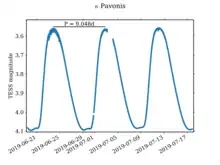
Lightcurve of the W Virginis (Type II Cepheid) variable κ Pavonis recorded by NASA's Transiting Exoplanet Survey Satellite (TESS).
W Virginis variables are a subclass of Type II Cepheids which exhibit pulsation periods between 10–20 days,[1] and are of spectral class F6 – K2.[2][3]
They were first recognized as being distinct from classical Cepheids by Walter Baade in 1942, in a study of Cepheids in the Andromeda Galaxy that proposed that stars in that galaxy were of two populations.[4]
See also
References
- ↑ Wallerstein, G., "The Cepheids of Population II and Related Stars", Publications of the Astronomical Society of the Pacific, 114 p.689–699 (2002)
- ↑ W. Strohmeier, Variable Stars, Pergamon (1972)
- ↑ Soszyński, I.; Udalski, A.; Szymański, M. K.; Kubiak, M.; Pietrzyński, G.; Wyrzykowski, Ł.; Szewczyk, O.; Ulaczyk, K.; Poleski, R. "The Optical Gravitational Lensing Experiment. The OGLE-III Catalog of Variable Stars. II.Type II Cepheids and Anomalous Cepheids in the Large Magellanic Cloud", Acta A., vol 58 (2008)
- ↑ Webb, Stephen, Measuring the Universe: The Cosmological Distance Ladder, Springer, (1999)
External links
- AAVSO Variable Star of the Month. W Virginis: Spring 2003 PDF / HTML
- OGLE Atlas of Variable Star Light Curves - W Virginis stars
This article is issued from Wikipedia. The text is licensed under Creative Commons - Attribution - Sharealike. Additional terms may apply for the media files.